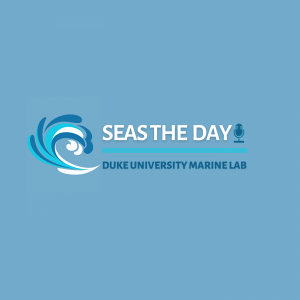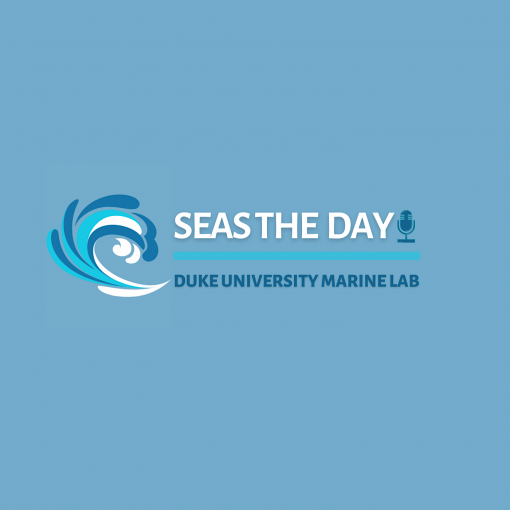Seas the Day is back from a summer break! Summer at a marine lab is a busy time when many faculty and students take advantage of the weather and a break from teaching to do ‘field work’. Field work is a core activity in many disciplines, sometimes described as a ‘rite of passage’ on the road to earning a PhD, and something many researchers look forward to throughout their careers. We asked Duke marine lab faculty, staff, and students to share their favorite (and often funniest) stories of field work. To kick off season 3 of Seas the Day , Lisa Campbell and Rafa Lobo weave together these stories of fieldwork fails and follies. Featuring Jillian Wisse, Brian Silliman, Dana Grieco, Stephanie Valdez, Matthew Godfrey, Xavier Basurto, Lisa Campbell, and Marty Smith.
Listen Now
Hosts
Rafaella Lobo and Lisa Campbell
Rafa and Lisa have been co-conspirators at Seas the Day from the beginning. This episode is a joint project and reflects their evolving interests — Lisa in scripting the story and Rafa in editing it. They worked together to cajole, badger, and ultimately convince their friends and colleagues to share their research stories…
Rafa twitter: @LellaLobo
Lisa twitter: @lismarcam
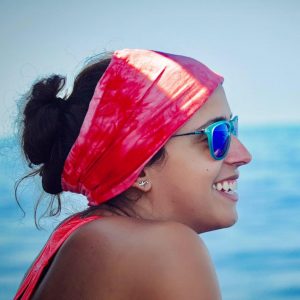
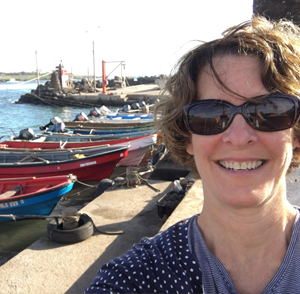
Interviewees (in order of speaking)

Jillian Wisse, PhD student at Dr. Doug Nowacek’s lab
Jillian Wisse is a PhD Candidate in Ecology at the Duke Marine Lab. She studies reproduction and stress in short-finned pilot whales and loves boat days spent musing about bizarre animal behaviors. As a former bartender, she believes strangers often have the best stories and loves being surprised by a good whale tale.
[Editor’s note: Jillian tells her own ‘whale tale’ in this episode. The research described in her story was authorized under NMFS Permit #14809]

Brian Silliman, Rachel Carson Professor Marine Conservation Biology
Brain holds both B.A. and M.S. degrees from the University of Virginia, and completed his Ph.D. in Ecology and Evolutionary Biology at Brown University. In recognition of his research achievements, Silliman was named a Distinguished Fulbright Chair with CSIRO in 2019; a Fellow of the American Association for the Advancement of Sciences in 2015; a Visiting Professor with the Royal Netherlands Society of Arts and Sciences in 2011; and David H. Smith Conservation Fellow with The Nature Conservancy in 2004. His teaching and research are focused on community ecology, conservation and restoration, global change, plant–animal interactions, and evolution and ecological consequences of cooperative behavior.
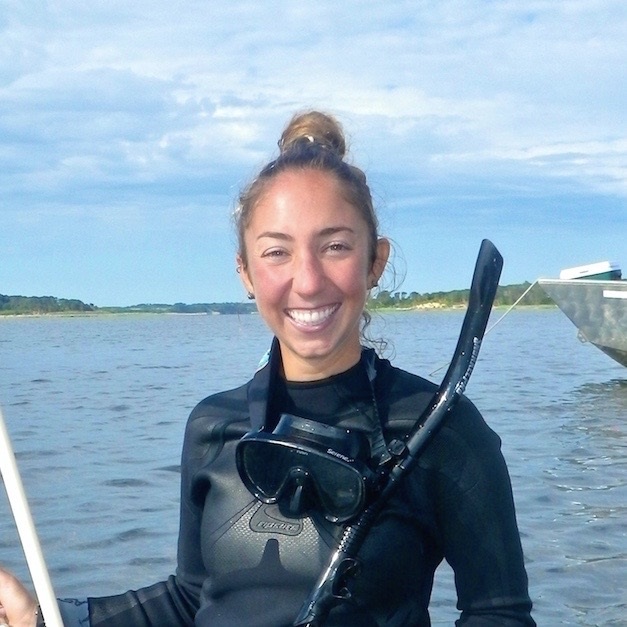
Dana Grieco, PhD student in Dr. David Gill’s lab
Dana is a member of the Ocean Synthesis (3S) Marine Lab with advisor David A. Gill . She completed her undergraduate studies in 2016 with a B.S. in biology and a marine ecology thesis from Villanova University. Dana then spent the following three years working in marine ecological research and many facets of the fishing and dive industries in Cape Cod, MA, and the Bay Islands, Honduras. Dana’s current research focuses on how fisheries and conservation interventions impact marine social and ecological systems, with a particular focus on small-scale, data-poor marine systems. Her methodology includes interdisciplinary systems-based approaches and participatory research techniques that value fisheries stakeholder knowledge.

Stephanie Valdez, PhD student at Dr. Brian Silliman’s lab
Steph has a bachelor’s degree inBiology from the University of Washington, she has been a volunteer coordinator for a citizen science organization called COASST (Coastal Observation and Seabird Survey Team), a research technician at the University of Washington and a “mixed assortment of other odd jobs” before coming to Duke for her PhD. She is currently an NSF GRFP Fellow as well as a Luce Fellow.
Twitter:@StephRValdez

Matthew Godfrey, Adjunct Associate Professor.
Dr. Matthew Godfrey is a wildlife biologist with the NC Wildlife Resources Commission. He is adjunct faculty at the Nicholas School of the Environment at Duke University and also at the Department of Clinical Sciences of the College of Veterinary Medicine at North Carolina State University. He has worked on sea turtle biology and conservation issues for several decades in a variety of different countries and field sites.
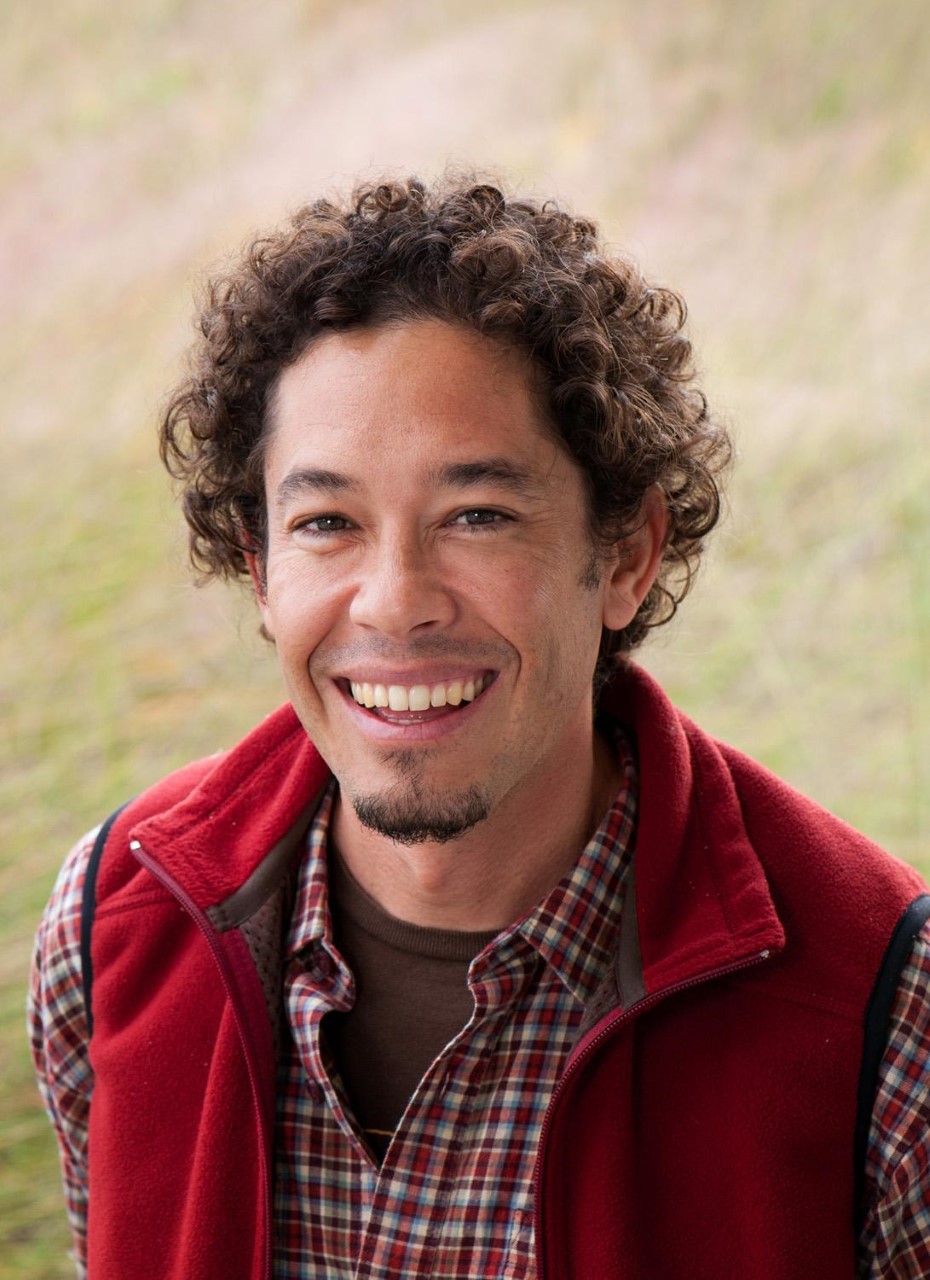
Xavier Basurto , Truman and Nellie Semans/Alex Brown & Sons Associate Professor
Xavier is interested in the fundamental question of how groups (human and non-human) can find ways to self-organize, cooperate, and engage in successful collective action for the benefit of the common good. To do this, he strive to understand how the institutions (formal and informal rules and norms) that govern social behavior, interplay with biophysical variables to shape social-ecological systems. What kind of institutions are better able to govern complex-adaptive systems? and how can societies (large and small) develop robust institutions that provide enough flexibility for collective learning and adaptation over the long-term? Trained as a marine biologist, he completed a M.S in natural resources studying small-scale fisheries in the Gulf of California, Mexico, and an MPA and a Ph.D. in Management (with a minor in cultural anthropology) from the University of Arizona.

Lisa Campbell, Rachel Carson Distinguished Professor of Marine Affairs and Policy
Dr. Campbell studies oceans governance broadly, in relation to diverse issues (blue economy, blue carbon, protected species, fisheries, MSP, MPAs, tourism, etc.), and formal and informal processes. She draws on theory from political ecology, political economy, and science and technology studies to study how science and other values, the state and non-state actors, inform governance processes and outcomes across geographic and socio-political scales.

Martin D. Smith, George M. Woodwell Distinguished Professor of Environmental Economics
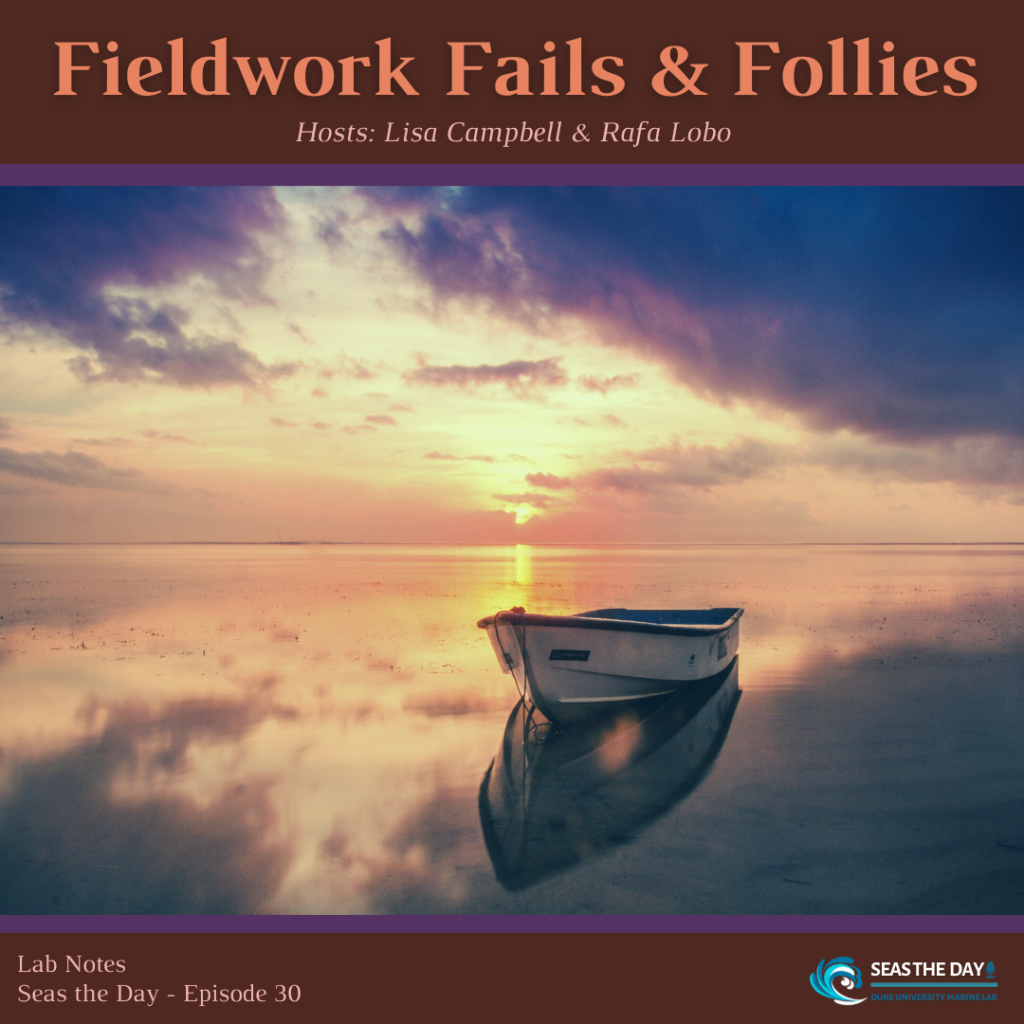
View Transcript
TRANSCRIPT
Rafa Lobo: Today, on Seas the Day…
Xavier Basurto: …And both tires were pinched.
Dana Grieco: And the next day when I got in, I noticed that there was a huge dent on the backside of that truck…
Matthew Godfrey: …At the far end of the beach, with a keyless jeep that was within range of the rising high tide…
Stephanie Valdez: …We make it about 100 meters and we hear this massive screeching noise coming from our boat area…
Jillian Wisse: …And then I just hear, I feel the boat just kind of like rock towards towards the big sailboat and I hear this like metallic shuffling and a kerplunk!
Dana Grieco: …So when I was about 2 miles away from our field site at 4:50 AM, I was supposed to be there at 5:00 AM, my car stopped in the middle of a turning lane in the middle of the road, my car stopped…
Brian Silliman: …The head backed up and it flooded my cabin…
Stephanie: …I picked the wrong path to go into our site and ended up walking like half a kilometer in this very thick like thigh high mud…
Lisa Campbell: Hey listeners, welcome to Seas the Day. It’s Lisa Campbell, here today with Rafa Lobo. Our team of Seas the Day recently asked members of our Marine Lab community to share their favorite stories of their fieldwork fails and follies. Here at Seas the Day we like to talk about research, but also about researchers as people – their humanness. And what experience is more human than failure? When listening to the responses we quickly identified a common theme. In spite of the diverse types of research done at the lab, ranging across engineering, natural sciences and social science, those introductory clips you heard point to that theme – transportation. To and from field sites, within field sites, in cars and on boats… The way we get around features prominently in the stories that people were willing to share. But there’s more. Much, much more. Let’s get started.
Rafa: Our first story is from Jillian Wise, a PhD candidate at the lab studying hormones in pilot whales. Just a head’s up, Jillian will talk about collecting blubber samples from whales. Blubber biopsies are commonly taken by shooting a small dart into the side of the whale, using a crossbow. This is an established research technique that causes minimal disturbance to the animal, and details of the permit to conduct the research are included on our website. Here’s Jillian:
Jillian: So, a few years ago I was doing some field work with a team based on a vessel called the Song of the Whale which is this really beautiful 72 foot I think sailboat rigged up to be really quiet for acoustics work. So, we were going really, really far offshore to survey all these different marine mammals, like edge of the exclusive economic zone, 200 nautical miles offshore, so it’s far. You are out there. So, there’s no coming back if you forgot something, if you happen to lose something. And this was at a point my PhD where I had been training to collect my own blubber biopsies which are these little tissue samples that we get from the animals and we can take them back to the lab and do stuff with hormones or genetics, stable isotopes, the type of stuff that I’m doing for my PhD. So, I felt like I was the person on the boat that could actually… you know this was where I could contribute to the effort, was helping people with these biopsies. And, so, we’ve seen these animals and people are kind of taking turns going out and collecting biopsies or putting tags on and we came up on a group of multiple sperm whales and they’re the coolest animals ever, but lots of calves like blowing bubbles and you know leaping out of the water and it was incredible and I’m dying to go out on a little boat to do these biopsy samples.
So, we started loading the boat and I’m waiting and hoping that it’s going to be my turn to go on the boat and finally my advisor says “OK Jillian you wanna come on” I’m like “Yes! Yes, I’m going out, I’m going to help collect these biopsies.” It’s a small boat there’s only room for three people and really only room for two people. So, we’re loading up this tiny boat off the side of this massive sailboat and we’re taking like one piece of equipment down at a time, getting us onboard, you know the boats rocking back and forth the weather wasn’t horrible but it was moving, so you know we’re like crawling down slowly, carefully. People are handing us stuff so I’m excited, nervous, shaking. And someone hands the crossbow and I’m like “yes we’re gonna, we’re gonna get samples from these incredible animals.” I put in the crossbow and then someone hands me something else, you know, camera, and I load it in the boat and the iPad, load it in the boat, and we’re waiting, we’re looking up for the next thing and someone else is about to come down, and then I just hear… I feel the boat just kind of like rock towards towards the big sailboat and I hear this like metallic shuffling and a kerplunk. And I realize in that moment that the crossbow which I had just set on the boat in a very precarious situation had gone overboard and was now sinking down to the bottom of the ocean which is like you know in this spot maybe 3000 meters down. This thing is not coming back and these animals are here we are like frantically trying to go get these samples and this crossbow is gone. And my heart dropped you know ’cause I’m early career, this is my opportunity to help and I have royally messed this up.
Lisa: Like Jillian, many marine scientists work on boats, and boat work is subject to weather. Working on boats also means sometimes working in cramped quarters, and these two features of boat work can combine in interesting ways. In this next story, Professor Brian Silliman describes one of his first boat-based research experiences, on an expedition to the Bahamas. The combination of weather and close quarters may help explain why he now focuses on coastal ecosystems that don’t necessary require use of boats.
Brian: We had a grand adventure going over to the Bahamas, we got on the boat the RV bellows, it was a University of Florida boat and it has a belly of a bottom so it really doesn’t move well in the water. And we went from Fort Lauderdale over to the Bahamas and once we hit the Gulf Stream, boy that boat started rocking I got really, really seasick and that stayed with me I couldn’t sleep in my bunk and had to sleep outside and that stayed with me for almost a day over until we got there. And I really couldn’t do anything to plan for this research. Then as soon as we got there the weather picked up and none of us could go out offshore so we were stuck on the boat. The next thing that happened was that the head backed up and it flooded my cabin and so again I couldn’t sleep inside and had to sleep out on the deck for four or five days. Still couldn’t get out to the to the reef.
Rafa: Boats aren’t just challenging on the water, sometimes the challenge is getting them to the water. Non-boat people may not be familiar with the term ‘trailering’. Here is Dana Greico, on the skill of ‘trailering’, necessary for many marine scientists.
Dana: A field work mishap that I had working in a restored marine lagoon and I’m not going to tell you where that mishap happened because I want to protect some form of integrity as this is a story I don’t really share. But anyway, we had been sampling benthic sampling on this restored marine lagoon and doing field work as much as possible. Truly, any day the weather was great, we would go, and I was always the one who was trailering the boat. We had a big truck. I would trailer the boat. I was feeling pretty confident at this point in the summer and I’d been doing it a lot. And so, one day my boss asked me if I could trailer a different boat with some really expensive equipment on it to a site where they were doing deeper benthic sampling. And I said sure, and I took it down there. I had to make some tight turns getting out of the parking lot, but then the drive was a breeze after that. And I brought the truck back up to our field site. After I dropped the boat off with folks there and I went home. And the next day when I got in, I noticed that there was a huge dent on the backside of that truck on the, it just kind of around where the wheel is, and so I went and checked in with my boss and I said “you know there’s a huge dent on this truck.” And we were trying to figure out how it happened, you know, was somebody else in the parking lot moving something at night and they didn’t notice that they put a dent in the truck, or how could something have really hit it at that angle? And so as we’re talking about this I am picturing myself trailering the boat the day before with all the heavy equipment on it and I’m picturing myself making the tight turns in the parking lot, and I realized to my horror that I think it was actually me who dented the truck with the boat on the trailer when it was at a 90 degree angle, actually digging in on the corner of the boat to the side of the truck to make that dent. And so, in that moment I had to be the one to tell my boss that actually I think that I made the dent the day before and it was a huge dent I mean we were talking about potentially not driving the boat it was not a small dent. So, I thought that you know I was gonna lose my job forget marine science. This career path was over for me.
Lisa: Stephanie Valdez, another PhD student at the lab, has also been building her trailering skills
Stephanie: I am an ecologist that focuses on nearshore coastal vegetative habitats like marshes and seagrasses. So recently, as I’ve been progressing through my PhD, I’ve been working on our boat more and because some of my sites are remote. And recently we had some trailer troubles that thankfully are now pretty funny to look back on. So, the main story is we were out doing some field work, me and another colleague, and we ended up finishing our field work, getting the boat onto the trailer, and we started to head home for an early lunch. We were excited that we’re going to make it back and it was going to be great. Like we had gotten everything we’ve done we had needed to get done. We make it about 100 meters and we hear this massive screeching noise coming from our boat area. And we stop, we look around, we don’t see anything immediately wrong with the boat or the trailer, so we keep going. We make it probably another 100 meters to the stop sign and we just can’t shake this feeling that something is wrong. So, we take another look around and my colleague points out that the axle on our boat trailer just doesn’t look quite right. So, we call up our marine OPS person and we’re like “hey this axle doesn’t look quite right” sitting in this tire. Turns out we were right. So, he gets a flatbed tow truck to come out and take a look at the the boat and the trailer. And mind you we’re about 45 minutes away from our marine lab, our home base, and we find that the truck is busy the truck that was coming to get us was busy and it’s going to take them about oh, 2 hours to come and get us. There goes our lunch. So, the wait wasn’t bad. We hung out we talked we ate some of the snacks that we thankfully had and then finally this flatbed truck shows up and he starts pulling the boat and the trailer all is one unit onto this flatbed truck, and we soon realize that this truck might not be big enough to fit the trailer and the boat. The person working the truck takes several angles at it, it’s starting to pull up the truck, there are many scary moments, and we’re just like, it’s not going to work, like there’s no way. And at one point in time, I’m the one that’s operating the lift of this manual flatbed truck, with my colleague on the boat and she is being lifted into the air about 20 feet. Both of us are like freaking out like this is not, I should not be working this heavy equipment and she should not be on this boat right now. In the end the boat does end up fitting with the trailer. And in this whole process the tire that we were worried about ends up falling off the boat. It was not attached whatsoever the axle was just sitting in the tire and it was bound to fall off any minute if we kept driving. So thankfully we did stop and we did fix this situation but it has led to a comical story. And, silver lining, we were able to leave that day with just the truck and didn’t have to clean the boat for several days.
Rafa: Trailers are not the only challenging land-based vehicles, and sometimes the challenge is really a case of operator error. Our next story is from Matthew Godfrey, adjunct professor at the marine lab, and wildlife biologist with the State of North Carolina.
Matthew: After I finished grad school, I was working at the national sea turtle project in Brazil. One of my responsibilities there included the daily morning patrol of the adjacent beach, to identify and mark new sea turtle nests. At the height of the season, when many nests were laid in a single night, the morning patrol could take a while, so as a reward for those long mornings, at the far end of the beach, when we finished patrol, we would jump into the ocean and wash off the sand and sweat before returning to the base. One day, and I don’t know why, I decided to take the key out of the ignition of the patrol jeep and put it in to my pocket before jumping in the water. Of course, the key fell out in the waves. As a result, we were stuck at the far end of the beach, with a keyless jeep that was within range of the rising tide – which we thought was going to happen in about 6 hours. Also, it was a Saturday, so I knew the project office would close at noon and would not reopen until Monday. With rising panic at the thought of losing a jeep to the tide, I sprinted ten kilometers back to the base, burst into the office, crying, barely breathing, and tried to explain, calmly, what happened. After, there was silence, as the project coordinator stared hard at me for what seemed like an eternity, slowly shaking her head, before she picked up the phone and managed to find someone to go out and get the jeep off the beach. Afterwards, there was never any official discussion or admonishment about how I lost the key, but it wasn’t necessary. That’s because the jeep remained keyless – it had a simple toggle switch installed to make it start. And every time someone used the hotwire toggle switch to start up the jeep, they simply stared at me wordlessly, slowly shaking their head.
Lisa: Operator error is also familiar to Professor Xavier Basurto. In this next story about a vehicle mishap, you’ll hear Xavier refer to Hillary. Hillary is Dr. Hillary Smith. But at the time, she was one of Xavier’s graduate students. They were invited to a meeting of the World Forum of Small-Scale Fishers and Harvesters, and they attended in part to help Hillary develop her dissertation research. As you listen to Xavier’s story, try to imagine it from Hillary’s perspective, on her first ‘field work’ outing with her advisor.
Xavier: In 2017 we made like kind of a last-minute trip to Ecuador. And so, the meeting was in Salinas, Ecuador, about two hours away from the capital where we flew in. We went to the meeting, it was interesting, people from all over the world, or fishery leaders from all over the world. And the way back, we we needed to drive back two hours in this rental car and take our plane. And we didn’t have a lot of time to spare, so we left Salinas and start driving. And you know we were gonna be at the airport in just the right amount of time. And we’re navigating you know through the capital I’ve never been there and so we’re using Google Maps. And as we are, I don’t know, three miles, two miles from the airport, I inadvertently step onto a rail that separates the bus lane from the car lane. It was a strange intersection. And both tires were pinched. Both tires of this rental car on the left side were flat. And I was like “we’re gonna miss our fight. We’re stuck. We’re gonna miss our flight.’ And we couldn’t miss our flight. We were, you know, needed to get a lot of things done in the way back. So, we looked, like actually we’re just one mile from the airport. So, I decided ‘OK get in’ and, or we decided to drive like that, and slowly we made our way to the airport. And I will never forget the faces of the taxi drivers that are just, you know, relaxed, leaning against their cars at the entrance of the airport where they saw this rental car come in with two flat tires. As people were rolling in, got off with our stuff, go and talk to the rental car guys, explain the situation, and you know give the car and go and get our flight. Which we didn’t miss.
Rafa: While most of the stories of field work follies involve getting to and from the ‘field’, a couple involve challenges with research. First, let’s hear from Brian Silliman again, this time, on transferring field experiments run successfully in one location, to another one:
Brian: I went to get my PhD at Brown and we were going to test the generality of the importance of snail grazing on salt marshes that I found in Virginia and Georgia marshes. And my advisor Mark Burton said “you arrange for everything, take care of the housing and stuff like this ’cause you know what you’re doing. Get the equipment the caging and stuff. And here’s, here’s $10,000, that’s all I have to do it.” So, I listened and this is fantastic! I bought everything. Everything was arranged and we flew down there and all the caging material, about $8000 worth of caging material, had shown up on the island ahead of time. So, we’re ready to go and I estimated based on the replication that we would need two weeks of work. One week making cages, one week deploying. So, he took off the time, got somebody to take care of the teaching for him, the two of us were going to do this. We get down there and the professors walk us through the marsh and I’m getting a little nervous. There’s lots of snails, but they’re really, really small. And I hid some of those snails in my pocket and then when the three of us went back to the marine station at the University of Georgia on Sapelo island, sheepishly I stole over to the area where the cages were, and I pushed that snail against the cage and it went right through the mesh. And that was the biggest snail I could find. So, then over dinner I quietly admitted, I said “I think we have caging material that won’t work.” He said “what do you mean?” I said: “I think it’s just too big for all the snails.” And his response was not to talk to me. So, my adviser didn’t want to talk about it, I knew I had to fix it. So, I spent the next two weeks trying to find replacements and the only answer was that it would take a month for this to come down to this isolated area in Georgia and for us to pick up our task there. So, he had to leave in the meantime. And then we spent the rest of the time, I stayed down there, instead of two weeks, I stayed down there three months.
Lisa: For social scientists who study people, communities, or institutions in specific geographic locales, field work presents different challenges, especially those related to interacting with people, both in and outside of formal research contexts. The next story is my own, taken from my PhD field work. But before we start, let me just say that for any social scientist listening, can I just say that Rafa and I are aware that our very understanding of field work, and how ‘the field’ is defined, has shifted dramatically in the social sciences? What and where is the field anyway? Okay, that’s a topic for another podcast, but we just needed to say that out loud: we know! Okay, here’s me:
Lisa: During my PhD research, I was living in rural Costa Rica studying a community-based wildlife management program. And I was really lucky to have my sister working with me as a field assistant and a translator. She was fluent in Spanish, and my language skills at the beginning of the field work were mediocre at best. So, very early on, we were invited to a community meeting, and these meetings are where the work of community management is debated and negotiated. So, we were super excited. The meeting was attended by more than 100 people, and it was really fast paced and a bit raucous. People talked over each other, lots of back-and-forth interactions, and jokes, lots and lots of jokes. So basically, a nightmare for someone who is not fluent in the language. But I listened really carefully and I was feeling pretty pleased with myself, because I found myself picking up on key ideas and major themes and I knew that I had my sister to help me unpack the things that I had missed. At the end of the meeting, someone asked me what I had thought. I was feeling pretty confident and I wanted to engage, so I replied that while I had found it all very interesting, I had one question. What was the chicken of the village? Now for those of you who don’t speak Spanish, let me tell you that “pollo,” the word for chicken as in the food that you eat, sounds an awful lot like “apoyo,” meaning support. And, in a community-based management program, it might make sense that people spoke of “apoyo del pueblo” – support of the village; and not “pollo del pueblo” – chicken of the village. Well, that gaff stayed with me for a while, and people would shout out to me, from houses, from cars, as they walked past me in the streets, “hey Lisa, where’s the chicken of the village” and later just “where’s the chicken.”
Rafa: Misunderstanding, possibly intentional, is at the heart of Professor Marty Smith’s story of failure. Marty also takes us to a different kind of field site, his classroom, where he sometimes runs economic simulations and experiments with his students.
Marty: My folly is about being in the field in the classroom. I like to run classroom games and use simulations to demonstrate a variety of concepts in economics — strategic interactions and performance of policy tools — policies that might be ones that we use to regulate fisheries or policies that we use to regulate pollution. So about 20 years ago when I was a new faculty member at Duke, I wanted to run a cap-and-trade simulation to demonstrate the benefits of using cap-and-trade to regulate pollution. And at the time I was using actually effectively individual clickers that students had at their chairs in my large environmental economics classroom, where I could ask them a true or false question or a multiple-choice question and they could click and see that their response was registered on the screen. And all the data would automatically download. And I thought, oh, this is a perfect technology for actually running a cap-and-trade simulation. I could run what’s called a tâtonnement auction. And that’s actually a rather simple way of running an auction where the auctioneer calls out a price and the individuals in the room indicate whether they want to buy or sell at that price and how many units. And so, I made it very simple. They could either buy or sell one two or three units and they could use their clickers to indicate that. And so, I told everyone, I distributed to everyone in advance what their marginal abatement costs would be — that means basically what would be the cost of reducing their pollution. And then I distributed permits to everyone so they had a baseline level of permits. So, I did all of this and calculated what the equilibrium was supposed to be in advance and there I was in the classroom and I set it all up and I called out the first price knowing exactly which way the market was supposed to move and lo and behold the market moved in in that direction. I had two I called out a price that I knew was too low and so I had too many buyers at that low price and so I needed to adjust the price upwards, that’s what the auctioneer in these markets does. So, I adjust the price upwards and I purposefully sort of overshot and then I had too many sellers at the at the much higher price and too few buyers. I said OK this is this is going great. So, then I thought OK now we’re going to start to refine down toward the price that I know is the correct equilibrium. So, the price is now too high right, so I call out a slightly lower price and all of a sudden, I see ‘Oh no so the price has gone down there’s even more firms that are willing willing to sell at the lower price that I just called out.’ And I thought what on earth has just happened so then I sort of think well you know who knows maybe some sort of anomaly here. I call out a lower price still and this effect happens again and then all of a sudden, I’m in a panic because this simulation is not working. We are not moving toward an equilibrium and the point that I’m trying to make with this lecture is not going to happen. So that starts to worry me and I’m sitting there sweating in a panic, trying new things, trying out different prices and seeing how recycling around the equilibrium and going nowhere and one of the students raises their hand and says “you know, some of us are not really playing the game. We’re just trying to click first to get recorded, our individual units recorded on the screen first. And that’s the game we’re playing.” And so, I thought, ‘Oh no…”
Lisa. One of the reasons we wanted to talk about field work failures and follies is because we know the stories are funny, but also because everyone seems to have them. And yet, when you experience your first one, it can seem like you are totally alone. But you are not. Remember Jillian, despondent after sending a crossbow to the bottom of the ocean? Here’s what happened next.
Jillian: And I can see in everyone’s faces, that everyone is hurting a little bit, and I’m obviously disappointed in myself. And later that night, we’re sitting around the dinner table and one of the senior scientists on the boat kind of looked at everyone and he goes “OK everybody now tell their worst field story. Tell Jillian the most expensive thing that you’ve broken or ruined or destroyed doing field work.” So, one by one everyone on the boat, these scientists that I really respect, told me about these wildly expensive and irreplaceable things that they had messed up, and made me feel so much better. Because I think it’s easy as an early career scientist to think of these one-off moments as being like career ending or my one shot is over and think that you’re the only one who’s ever messed this up. But it was incredibly reassuring to hear people who have made this far in their careers have similar experiences and honestly a lot of worse experiences than I had.
Rafa: Even when the logistics of fieldwork are going right, I mean driving, trailering, flying, boating—the research might still go wrong. And that too is okay. Here’s Brian Silliman.
Brian: one thing I tell all of my graduate students when they first start off is that really, really good field ecologists have a failure rate that’s about 50%, and it starts off about 80%. So, what that means is you’re gonna have a lot of great stories to share of about unsuccessful attempts at evaluating some idea and secondly that you need to have some backup plans. I guess the point being is that now I go into any situation, like going on a travel course, telling the students that the first second or third thing you gonna try is probably going to fail but the key is to think about backups as well as understand that the people that have gone before you have experienced many failures. And it’s important to talk about those to try to find your way around it and understand that it it’s part of the game.
Rafa: And stories of field work failures or follies often have happy endings. We’re going to leave you with another story form Xavier Basurto.
Xavier: One of the first times I took my Mexico course into the Sonoran Desert, we had a planned an outing to camp on Santa Rosa estuary which is at the beginning of the Seri or Comcac territories, it’s a really nice piece of desert and beautiful mangrove forest has three different species of mangrove great place for for camping. And I was a little bit rusty on how to get there. And I know there’s some there’s different numbers of roads to get there and some of them are sand traps and some of them are passable and I’ve got stuck in the sand so many times that I, you know, I have some idea of how to spot those roads that are pretty sandy. And it was yeah after they are you know early afternoon and and we started driving there and I realized there were many more road options that I initially considered and I took one that looked like the right one, and I started to realize that it was very soft and we were already in it, and when you’re in it you better keep going forward because these are very narrow roads in terms of you know it’s only a couple of tracks. And so, I realized that if I stopped with a 15-passenger van it would very hard to not get stuck. And so, I kept going thinking hopefully it will the road will end in a in a place where you know it’s firm again, which is usually the case when you get close to the water. And then I will be able to turn or camp there and and get out.
But the road just kept getting worse and worse and eventually we were stuck, and so and so we were in the middle of this beautiful desert and after a few tries I realized it was not a good idea to keep trying because you just getting deeper into the sand. So, we started hiking the desert to where we could have cell phone reception. It ended being this beautiful hike in the desert and when I contacted my friend the station manager, he said you know he could only come tomorrow to get us. So, we decided or I told the students to pull out the tents, we had everything in the van, and we’re gonna spend the night there. And it became a story of camping in the most unexpected place, but being one of the most beautiful camping experiences I’ve had precisely because it was a new place. It was a place that I hadn’t camped before and being in the middle of the Sonoran Desert, we saw things that we don’t see usually in my class because we’re usually camping by the water. Turns out there were lots of hummingbirds and lots of cactus plants that flower. And once it gets dark the flowers open and the smell of the flowers becomes intense and and it was just a beautiful, beautiful experience camping and you know it was a warm night, dark, with lots of stars. We just had a really great time. You could feel the students were a little bit kind of nervous at the beginning because this was not according to the plan, but as as the beauty of the sunset of the beauty of of the natural history around us started to to be more than evident, everybody relaxed and we had a great dinner. And it was just you know experience for for all the senses. You know beautiful sunset, smells from the desert, wildlife coming out. The road was so soft that it was great to put the tents in the middle of the dirt road and and just camp there. And the next morning my friend came out and pulled out the van we pulled out the van with no problem and and we continue our trip, but that night became one of the highlights of entire trip.
Rafa: We hope you enjoyed this episode of Seas the Day. If you did, please subscribe and write us a review, this will help other people find our podcast. You can also find us on Twitter and Instagram @SeasTheDayPod.
We want to thank all the students and faculty who submitted a fail or folly story, we had a lot of fun putting it all together.
You can find all of our past episodes, along with extra information on the materials and participants highlighted, on our website, at sites.nicholas.duke.edu/seastheday/
This podcast was written by Lisa Campbell, and put together by me, Rafa Lobo.
Our theme song is by Joe Morton, and our artwork is by Stephanie Hillsgrove.
Thanks for listening.

